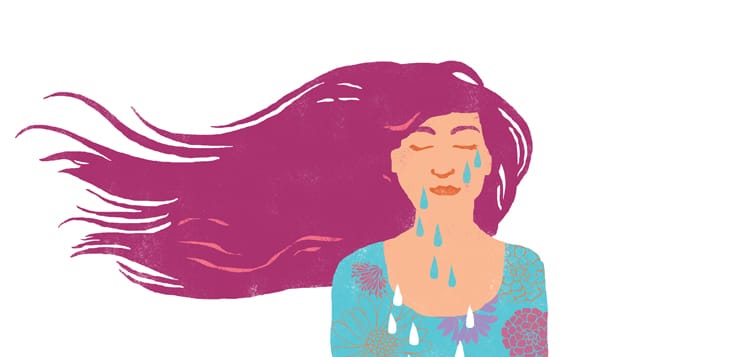When sitting with others, I become afraid of making a scene if I get emotional. What should I do?
Have you ever gotten the giggles during a very grave or serious situation? Have you ever tried to stop giggling in that situation? Pressing your fingers to your lips to stop the smile? Stifling the inappropriate but deeply physical urge to guffaw wildly? How’d that work out? How often did a singularly embarrassing and remarkably loud snort escape from you in a moment like that? The old saying is “what you resist, persists.” When you resist sleeplessness, you get insomnia. When you resist sadness, you risk depression. When you resist your daughter’s lousy boyfriend, you get a lousy son-in-law. This is a familiar experience to most of us. Ever tried to STOP worrying? How did that go?
There is no such thing as an illegitimate emotion. If you feel it, then it is as real as an emotion gets, and there is nothing wrong with having it. The challenge is to keep it from overtaking or overwhelming you, to have it simply inform you that you are feeling that way.
So the question becomes whether we can actually allow emotions to arise and flow through us naturally, because they are simply a part of human experience, and let go of resisting them so intensely. This is a significant part of mindfulness practice: to continually work to accept the presence of strong emotions (or any emotions) when they arise, to acknowledge them, and allow them to play themselves out. There is no such thing as an illegitimate emotion. If you feel it, then it is as real as an emotion gets, and there is nothing wrong with having it. The challenge is to keep it from overtaking or overwhelming you, to have it simply inform you that you are feeling that way.
I once read something in the book Bird by Bird, by Anne Lamott, that she’d found in a leaflet: “The Gulf Stream will flow through a straw provided the straw is aligned to the Gulf Stream, and not at cross purposes with it.” If I can align the straw of my own heart to allow the Gulf Stream of strong emotion to flow through it, I can keep my footing and simultaneously feel what I feel. So the task of dealing with the human reality that we feel strong emotions is to not resist them but to orient ourselves toward them in such a way that we can let go of resistance and allow them to flow. And remember: Everyone around you is also human, and every single one of us suffers and feels sadness, desire, frustration, despair, and anger. You are not alone in your feelings, even if that is how it feels in the moment. What you feel—including the feelings of isolation—actually unites you with all of us.






